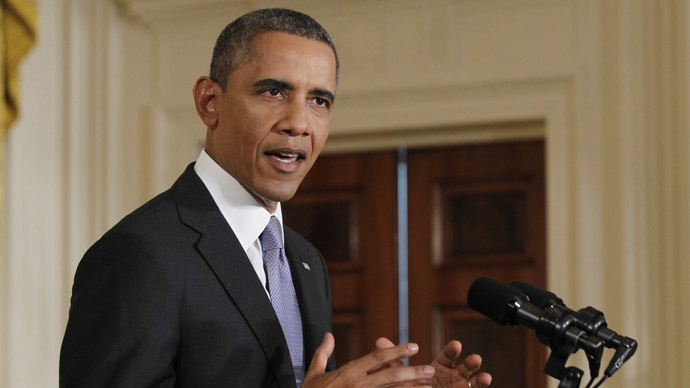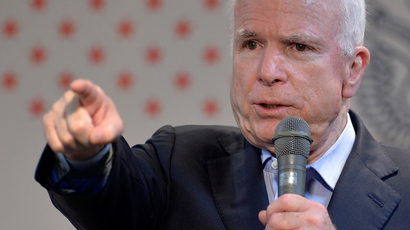Still not the ‘red line’: Obama edges away from ‘difficult, costly’ Syrian ‘mire’

Barack Obama has cautioned against US entry into the Syrian conflict, even though American intelligence believes the regime was likely behind a deadly chemical attack earlier this week. Previously, the president said chemical warfare was a ‘red line’.
Questioned on the continuing upheaval in Syria and Egypt during Friday’s CNN interview, Obama said the United States should be wary “being drawn into very expensive, difficult, costly interventions that actually breed more resentment in the region.”
Throughout his answers, the president sounded like a man reciting
a litany of reasons for not joining the 30-month internecine
conflict that has already claimed more than 100,000 lives
according to UN estimates.
"If the US goes in and attacks another country without a UN
mandate and without clear evidence that can be presented, then
there are questions in terms of whether international law
supports it, [and] do we have the coalition to make it work?”
said Obama.
The US leader is under renewed pressure to take action following
the emergence of footage of what appears to be the aftermath of a
toxic agent attack in a Damascus suburb on Wednesday. The forces
of President Bashar Assad were assaulting a rebel stronghold in
the district at the time, but deny responsibility. Moscow, which
has maintained close ties with the regime, called the incident a
rebel “provocation” possibly designed to derail upcoming
Geneva peace talks.
Republican Senator McCain immediately pinned the blame for the
incident – which opposition reports may have killed anywhere
between dozens and 1,300 people – on government forces. He also
said that if the administration was to “let this go on”,
it was “writing a blank check to other brutal dictators around
the world if they want to use chemical weapons." McCain also
outlined a concrete plan for a military incursion.

Inevitably, Obama called the attack “a big event of great
concern”, but bristled when faced with McCain’s accusations.
“What I think the American people… expect me to do as
president is to think through what we do from the perspective of,
what is in our long-term national interests?”
“Folks will call for immediate action, jumping into stuff… that
does not turn out well, gets us mired in very difficult
situations.”
Yet for all their cool-headed sense, Obama’s words unmistakably
clashed with his own pronouncements exactly a year ago, when he
claimed that any utilization (or even movement) of chemical
weapons by the government forces was a “red line” that
would engender “enormous consequences”.
But more than going back on his words, Obama seemed to question
the entire rationale for a US intervention.
While the conflict in Syria was never as simple as a battle of
democracy against dictatorship, even since Obama’s “red
line” quote the “mire” has grown increasingly murky.
Increasingly, the Syrian conflict has become divided along
religious lines, while outside forces with their own agendas have
picked their own sides. Documented atrocities by radical
Islamists among the rebels, and fears for the stability of a
future Syrian state, have also diluted outsider sympathies.
And while Obama insisted that the United States remains “the
one indispensable nation” in international diplomacy, he
suggested that perhaps this is not the one conflict where the
world should look to Washington for an answer.
"The notion that the US can somehow solve what is a sectarian
complex problem inside of Syria sometimes is overstated,"
said the president.
The White House later released a statement confirming Obama’s
words, and emphasizing that the US has no plans to put “boots
on the ground”.














